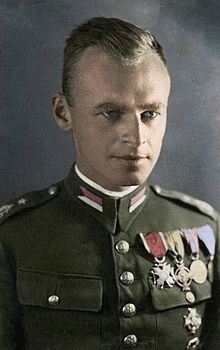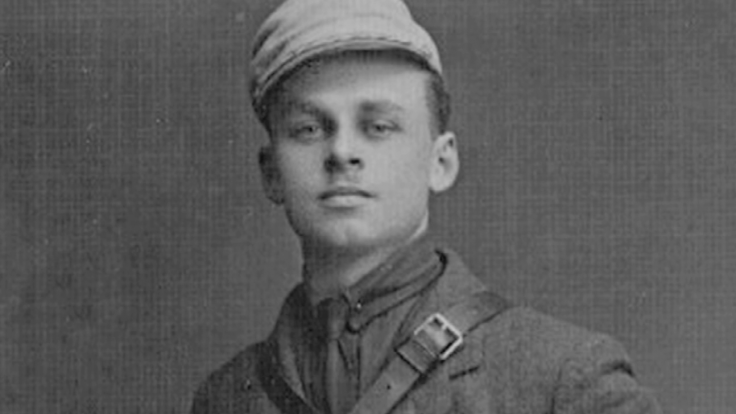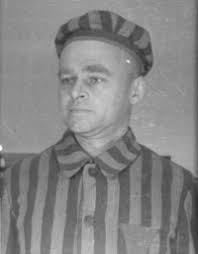"A man fighting for his life can do more than he ever imagined he could."
 Witold Pileckiwww.wikipedia.comAt least 1.3 million people were sent to Auschwitz during the 1940s, but only one volunteered his life to go. Witold Pilecki, born on May 13, 1901, was a Polish soldier unlike any other. He served in the army from 1918 to 1947. While in the army, he co-founded the secret Polish army and went on a mission to get information on Auschwitz when the camp was first created. He gathered information on how people were treated in the camp and gave his records to the army. He did this for almost two and a half years. Witold Pilecki was a Polish soldier who fought for what he believed was right and put his life at risk by courageously entering a concentration camp.
Witold Pileckiwww.wikipedia.comAt least 1.3 million people were sent to Auschwitz during the 1940s, but only one volunteered his life to go. Witold Pilecki, born on May 13, 1901, was a Polish soldier unlike any other. He served in the army from 1918 to 1947. While in the army, he co-founded the secret Polish army and went on a mission to get information on Auschwitz when the camp was first created. He gathered information on how people were treated in the camp and gave his records to the army. He did this for almost two and a half years. Witold Pilecki was a Polish soldier who fought for what he believed was right and put his life at risk by courageously entering a concentration camp.
 Witold Pilecki in Polish military uniformkrakow.tvp.plWitold Pilecki was known for fighting for what he believed in. When he took on the mission to go to Auschwitz and gather information on the camp, he co-founded the secret Polish army: “Pilecki set up teams in groups dubbed the Fives. Pilecki only allowed five-member teams, and he set up each team to work independently of the others so that if one group was caught, the entire operation could not be brought down. Among the resistance members, Pilecki worked to distribute additional food and clothing to keep them strong and healthy. Ultimately, Pilecki sought to prepare the group for combat should a relief attack occur. Pilecki envisioned the Home Army or Allied soldiers parachuting into Auschwitz with weapons and supplies to overtake the facility” (“Witold Pilecki”). Pilecki always did what he could to help. Throughout his entire life, he found joy in helping other people. This was one of the main reasons he joined the army. From going to Auschwitz to creating this secret Polish army, he never let his ideas of helping people go to waste. Sadly, these ideas ended his life: “when Pilecki finally escaped, in April 1943, the plan involved getting a work assignment in the bakery. It worked, although Pilecki took a bullet along the way” (Synder). Pilecki had an idea to help his fellow comrades in the camp. He created a system so they could cover each other’s food systems so each person had less work to do. Even facing the struggles one does at Auschwitz, he found a way to help out people he knew. Pilecki took every opportunity he saw possible to go help make other people’s lives better.
Witold Pilecki in Polish military uniformkrakow.tvp.plWitold Pilecki was known for fighting for what he believed in. When he took on the mission to go to Auschwitz and gather information on the camp, he co-founded the secret Polish army: “Pilecki set up teams in groups dubbed the Fives. Pilecki only allowed five-member teams, and he set up each team to work independently of the others so that if one group was caught, the entire operation could not be brought down. Among the resistance members, Pilecki worked to distribute additional food and clothing to keep them strong and healthy. Ultimately, Pilecki sought to prepare the group for combat should a relief attack occur. Pilecki envisioned the Home Army or Allied soldiers parachuting into Auschwitz with weapons and supplies to overtake the facility” (“Witold Pilecki”). Pilecki always did what he could to help. Throughout his entire life, he found joy in helping other people. This was one of the main reasons he joined the army. From going to Auschwitz to creating this secret Polish army, he never let his ideas of helping people go to waste. Sadly, these ideas ended his life: “when Pilecki finally escaped, in April 1943, the plan involved getting a work assignment in the bakery. It worked, although Pilecki took a bullet along the way” (Synder). Pilecki had an idea to help his fellow comrades in the camp. He created a system so they could cover each other’s food systems so each person had less work to do. Even facing the struggles one does at Auschwitz, he found a way to help out people he knew. Pilecki took every opportunity he saw possible to go help make other people’s lives better.
 Witold Pilecki in prisoner attire in Auschwitzwww.executedtoday.comWitold Pilecki’s courage during the time of Nazi Germany helped gather information on Auschwitz that would be unknown if not for him. Pilecki was enrolled in the army and he was one of the best soldiers they had ever seen. He was compassionate, and was known for taking on risky missions, such as entering Auschwitz: “in 1940, as the London-based Polish government-in-exile puzzled over what might be going on in the still little-known camp the Nazis had set up in Auschwitz, Pilecki--then 39 and a founder of the Polish Resistance--volunteered to find out” (Bethune). At the time, the only information that was really known about the camp was that Hitler planned to send every Jew there to kill them. Even knowing this, Pilecki willingly entered this camp knowing the risks and how it could potentially end his life. He knew they could mistake him as a Jew, and have him murdered. He entered anyway, giving the army vital information that they had not known. Because of Pilecki, the army tried to save as many people as possible from being killed in the camps. Even with being in the army, he couldn’t imagine the kind of things that occurred in the camp: “after traveling a day by freight car with no food or drink, the prisoners arrived at Auschwitz and were harassed and beaten by guards who turned their guns on some of the captives to show who was in command... Pilecki also lost his two front teeth after a blow to the mouth, dispensed because he was holding his prison card number in his hand and not between his teeth as the washroom supervisor had wanted...There were no bunks at this time, so Pilecki slept on the floor” (“Witold Pilecki”). Pilecki never thought twice about entering this camp. While other soldiers took a long time to think about it or didn’t even consider it an option, he never once doubted going. Even in the camp, he did many brave things for other people without being asked. He tried to share work with other people so they would have less, he shared his blankets and pillows with whoever needed them most, and he tried to stick up for people when they couldn’t stick up for themselves. These little things had a huge impact of many of the people in the camp, and Pilecki could have been beaten if the guards knew what he was doing. The acts of courage Witold Pilecki showed could have cost him his life, but he cared more about saving other people than saving himself.
Witold Pilecki in prisoner attire in Auschwitzwww.executedtoday.comWitold Pilecki’s courage during the time of Nazi Germany helped gather information on Auschwitz that would be unknown if not for him. Pilecki was enrolled in the army and he was one of the best soldiers they had ever seen. He was compassionate, and was known for taking on risky missions, such as entering Auschwitz: “in 1940, as the London-based Polish government-in-exile puzzled over what might be going on in the still little-known camp the Nazis had set up in Auschwitz, Pilecki--then 39 and a founder of the Polish Resistance--volunteered to find out” (Bethune). At the time, the only information that was really known about the camp was that Hitler planned to send every Jew there to kill them. Even knowing this, Pilecki willingly entered this camp knowing the risks and how it could potentially end his life. He knew they could mistake him as a Jew, and have him murdered. He entered anyway, giving the army vital information that they had not known. Because of Pilecki, the army tried to save as many people as possible from being killed in the camps. Even with being in the army, he couldn’t imagine the kind of things that occurred in the camp: “after traveling a day by freight car with no food or drink, the prisoners arrived at Auschwitz and were harassed and beaten by guards who turned their guns on some of the captives to show who was in command... Pilecki also lost his two front teeth after a blow to the mouth, dispensed because he was holding his prison card number in his hand and not between his teeth as the washroom supervisor had wanted...There were no bunks at this time, so Pilecki slept on the floor” (“Witold Pilecki”). Pilecki never thought twice about entering this camp. While other soldiers took a long time to think about it or didn’t even consider it an option, he never once doubted going. Even in the camp, he did many brave things for other people without being asked. He tried to share work with other people so they would have less, he shared his blankets and pillows with whoever needed them most, and he tried to stick up for people when they couldn’t stick up for themselves. These little things had a huge impact of many of the people in the camp, and Pilecki could have been beaten if the guards knew what he was doing. The acts of courage Witold Pilecki showed could have cost him his life, but he cared more about saving other people than saving himself.
Witold Pilecki was brave and stood up for his thoughts during a time where it was risky to do so. Being a Polish soldier, he had many dangerous tasks that often meant risking his life. Enrolling in the army is already a very courageous task, but taking on a mission to go to a camp nicknamed “The Death Camp” is beyond courageous, it is inspirational. Pilecki taught people to be selfless and care about the needs of others. He set the example of helping others and doing what you believe is right. He lived by doing these two things, an accomplished astonishing things in his life. He has inspired people to take risks and speak out their thoughts.
Bethune, Brian. "The man who volunteered for Auschwitz." Maclean's, 2 July 2012, p. 84. Biography In Context, https://link.galegroup.com/apps/doc/A296255694/BIC?u=powa9245&sid=BIC&xid=70ffa50.
Accessed 14 May 2018.
Snyder, Timothy. “'The Auschwitz Volunteer,' by Witold Pilecki.” The New York Times, The New York Times, 22 June 2012, www.nytimes.com/2012/06/24/books/review/the-auschwitz-volunteer-by-witold-pilecki.html
"Witold Pilecki."
Encyclopedia of World
Biography, vol. 36, Gale, 2016. Biography In Context,
https://link.galegroup.com/apps/doc/K1631010520/BIC?u=powa9245&sid=BIC&xid=1ad05cef. Accessed 14 May 2018.
Page created on 5/25/2018 6:31:44 PM
Last edited 5/28/2018 6:07:08 PM
